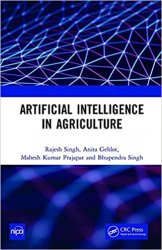Artificial Intelligence in Agriculture
- Добавил: literator
- Дата: 29-09-2021, 10:11
- Комментариев: 0
 Название: Artificial Intelligence in Agriculture
Название: Artificial Intelligence in AgricultureАвтор: Rajesh Singh, Anita Gehlot
Издательство: CRC Press
Год: 2022
Страниц: 187
Язык: английский
Формат: pdf (true)
Размер: 10.1 MB
This book is a platform for anyone who wishes to explore Artificial Intelligence (AI) in the field of agriculture from scratch or broaden their understanding and its uses. This book offers a practical, hands-on exploration of Artificial Intelligence, Machine Learning (ML), Deep Learning (DL), computer vision and Expert system with proper examples to understand. This book also covers the basics of Python with example so that any anyone can easily understand and utilize Artificial Intelligence in agriculture field.
This book is divided into two parts wherein first part talks about the Artificial Intelligence and its impact in the agriculture with all its branches and their basics. The second part of the book is purely implementation of algorithms and use of different libraries of machine learning, deep learning and computer vision to build useful and sightful projects in real time which can be very useful for you to have better understanding of Artificial Intelligence.
TensorFlow: Google, along with the team of Brain, created this library. For almost every Google machine learning program, TensorFlow is used. As neural networks can be easily represented as computer graphs, they can be used as a Tensor operation using the TensorFlow method, TensorFlow operates like a code-library for writing new algorithms involving a number of tensor operations. Moreover, tensors represent the data in N-dimensional matrices.
Matplotlib: Matplotlib is a popular data visualization library for Python. It’s not related to machine learning directly, like Pandas. It is especially useful to imagine patterns in the data if a programmer wants to. This is a library for 2D plotting used for the development of 2D plots. A module called pyplot makes it easy for plotting programmers to control line styles, fonts, axes, etc. It offers different types of graphs and plots for viewing data, e.g. histograms, error charts and chats, etc.
After reading this book, the reader will an understanding of what Artificial Intelligence is, where it is applicable, and what are its different branches, which can be useful in different scenarios. The reader will be familiar with the standard workflow for approaching and solving machine-learning problems, and how to address commonly encountered issues. The reader will be able to use Artificial Intelligence to tackle real-world problems ranging from crop health prediction to field surveillance analytics, classification to recognition of species of plants etc.
Contents:
Preface
PArt A: fundamental of Artificial Intelligence
Chapter 1 Artificial Intelligence
Chapter 2 Learning Python for Artificial Intelligence
Chapter 3 Machine Learning
Chapter 4 Deep Learning
Chapter 5 Computer Vision
Chapter 6 Knowledge Based Expert System
PArt B: implementation of Artificial intelligence
Chapter 7 Tools for Artificial Intelligence
Chapter 8 Important Libraries for AI
Chapter 9 Machine Learning Algorithms
Chapter 10 Disease Classification and Detection in Plants
Chapter 11 Species Recognition in Flowers
Chapter 12 Precision Farming
Скачать Artificial Intelligence in Agriculture
Внимание
Уважаемый посетитель, Вы зашли на сайт как незарегистрированный пользователь.
Мы рекомендуем Вам зарегистрироваться либо войти на сайт под своим именем.
Уважаемый посетитель, Вы зашли на сайт как незарегистрированный пользователь.
Мы рекомендуем Вам зарегистрироваться либо войти на сайт под своим именем.
Информация
Посетители, находящиеся в группе Гости, не могут оставлять комментарии к данной публикации.
Посетители, находящиеся в группе Гости, не могут оставлять комментарии к данной публикации.
